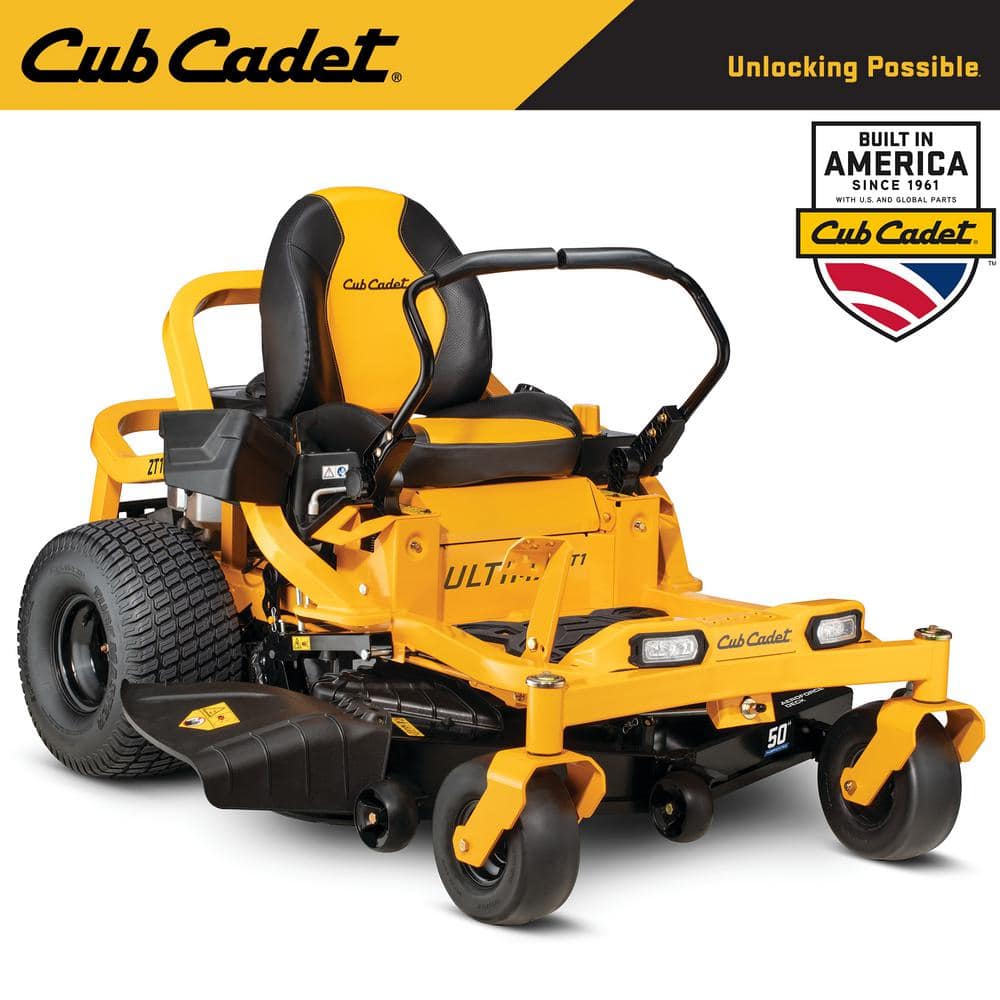Greenworks 60V 42” Electric CrossoverZ Zero Turn Mower with (4) 8 Ah Batteries and (2) Dual Port Turbo Chargers
Cut 14% faster than gas with constant blade speeds of 17,000 ft/min The Greenworks 60V Zero Turn features the most advanced power-cutting system in the industry. Where gas mowers bog down, our mowers sense extreme conditions to send optimal power to the blade motors, maintaining a constant blade speed of 17,000 ft/min through tall, thick, and wet grass.
Cutting Deck: Large 42″ cut width What’s Included: (4) 8 Ah Batteries and (2) Dual Port Turbo Chargers Power 75+ Tools with any Greenworks 60V Battery Power Output: 24 HP Charge Time: Just under 90m. Blade Tip Speed: Constant 17K ft/min Drive Speed: 8 mph, Industry’s Fastest Cutting Slope: 15° w/ traction control
- Cut 14% faster than gas with constant blade speeds of 17,000 ft/min The Greenworks 60V Zero Turn features the most advanced power-cutting system in the industry. Where gas mowers bog down, our mowers sense extreme conditions to send optimal power to the blade motors, maintaining a constant blade speed of 17,000 ft/min through tall, thick, and wet grass.
- Cut all-day with “Mow, Swap, and Go” technique: XL Property Hack: Mow up to 1.75 acres on a single charge with (4) included 8 Ah batteries, or mow all day by using 2 batteries in the mower while the other 2 fully charge. The secret: place one battery only in each Dual Port Turbo Charger, then “Mow, Swap and Go” for virtually endless runtime and coverage.
- Experience Greenworks’ Intelligent Power and gas-free future of lawn care. Sharper, faster, stronger.
Additional information
| Outdoor Equipment Propulsion Method | All Wheel Drive |
|---|---|
| Power Type | Battery |
| Cutting Width | 42 in |
| Features | Adjustable Cutting Height |
| Volts | 60 V |
| Contained Battery Type | Lithium Ion |
| Assembled Product Dimensions (L x W x H) | 66.92 x 53.14 x 46.06 Inches |






by Chris
[This review was collected as part of a promotion.] I’ve had my Greenworks zero turn mower for almost a year. We have a 2 acre lot and I’ve used the mower not only for mowing, but also as a mini-tractor pulling my dump cart and pull-behind yard rake. I love the convenience of instant on and off, the quietness, and the fact I have no oil or gas smelling up my garage. The mower has plenty of power to do all I need and the batteries last long enough to get the job done.
by Miker
I have two of these for an “on the side” mowing business. I have had a competitors gas zero turn and a competitors battery and neither were as good as this mower. Handles very well, cuts very nice at top speeds and is very durable.
by Auntie
My 80V zero turn mower with bagger has left a clean cut and no leaves. The bags filled faster than I expected but I’m getting better at anticipating how much is enough.
by Treebeard
Update after using bagger accessory for autumn leaf removal. Love it. Maybe not quite as thorough as a high powered leaf blower but so much easier and quieter and it gets the job done. The mower blades chop the leaves so some of the pieces fall down into the turf. I found that if there’s a thick layer of leaves then running over the yard with the bagger chute removed and the mulch plate installed and then re-installing them for a second run creates a much finer mulch suitable for garden beds. It also means I only need to empty the bags twice instead of 6 times. The chute and mulch plate are easy to swap on and off with just a philips screwdriver and small pair of channel lock plyers. The two bags are easy to remove and empty. Just keep an eye on the transparent section of the chute, and as soon as you see the leaves swirling around the bags are full. If the chute does get clogged it’s very easy to unhook and clean out. Also the plastic hood over the bags doesn’t really need to have the strap engaged every time as it stays fully closed even when the bags get over-filled. BTW, it’s probably much less effective if the leaves get wet, so I’ll mow them 4 or 5 times in the fall if rain is frequently in the forecast. I still use an electric leaf blower to get them away from trees and shrubs, etc, and for cleaning off the mower before putting it away.
by Bob
I can’t say enough good things about this mower. I hate to do yard work but using this mower makes it fun,it’s a pleasure to use. I have had it a couple months now and I love it. You can use it without hearing protection it’s so quiet. I had a cub cadet 42” hydrostatic drive before and I don’t know if it’s the blade design or the blade speed but it cuts so much better then the Cub Cadet. This is a great product. I hope to get many years of use from this mower. Thanks Greenworks.
by Jaksek
I love mine. I use to think you had to have skill to mow a yard and make it look good… you don’t. You need awesome equipment like this.